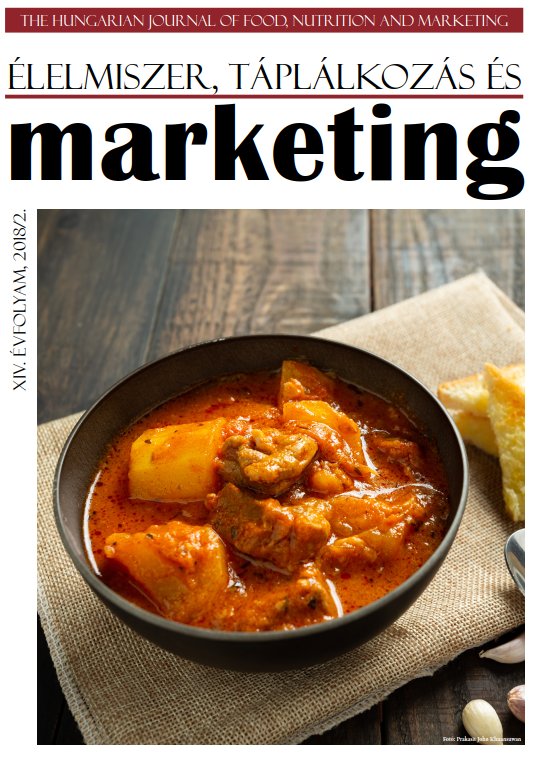A MATE folyóirat-kiadói felülete a MATE OJS-alapú, nyílt hozzáférésű folyóiratainak gyűjtőhelye. A MATE Journals szolgáltatásról bővebben honlapunkon a Rólunk fül alatt tájékozódhat. A MATE folyóiratait az alábbiakban betűrendben mutatjuk be.
Revistas
-
4D Tájépítészeti és Kertművészeti Folyóirat
Tájépítészeti és Kertművészeti folyóirat ׀ Journal of Landscape Architecture and Garden Art
ISSN 1787-6613 (Nyomtatott)
ISSN 2939-886X (Online)A 4D a Magyar Agrár- és Élettudományi Egyetem Tájépítészeti, Településtervezési és Díszkertészeti Intézetének tulajdona. A tulajdonost az Egyetem rektora képviseli.
-
Acta Agraria Kaposváriensis
ISSN 1418-1789 (Nyomtatott)
Az Acta Agraria Kaposváriensis évente több alkalommal megjelenő tudományos folyóirat, amely eredeti tudományos közleményeket, kutatási eredményeket, kritikai összefoglalókat (review), könyvismertetőket, konferenciákról szóló ismertetéseket és különszámként teljes konferenciaanyagokat közöl a mezőgazdasággal kapcsolatos alap- és alkalmazott tudomány területeiről.
Alapítva: 1997-ben a Kaposvári Egyetem jogelőd intézményében a Pannon Agrártudományi Egyetem Állattenyésztési Karán. -
Acta Carolus Robertus
ISSN 2498-9312 (Online)
A Magyar Agrár-és Élettudományi Egyetem Károly Róbert Campusának tudományos közleményei
Alapítva: 2011-ben a Károly Róbert Főiskolán -
ACTA REGIONIS RURUM
ISSN 1789-5588 (Nyomtatott)
Az Acta Reionis Rurum című periodika előzménye a Szent István Egyetem (később MATE) Gazdaság- és Társadalomtudományi Karán a Kar 50 éves jubileuma alkalmából elindított könyvsorozat, amely faluszemináriumi kutatások eredményeit tartalmazza.
Alapítva a Szent István Egyetem Gazdaság- és Társadalomtudományi Karán 2007-ben. -
Acta Scientiarum Socialium
Acta scientiarum socialium : historia, philosophia, sociologia = Társadalomtudományi tanulmányok
ISSN 1418-7191 (Nyomtatott)
A folyóirat humán és társadalomtudományok, elsősorban a történelemtudomány, a neveléstudomány és a gazdaságtudományok területéről jelentet meg tematikus számokat.
Alapítva 1998-ban a Kaposvári Egyetem jogelőd intézményében a Pannon Agrártudományi Egyetem Kaposvári Kar Társadalomtudományi Tanszékén. -
Animal Welfare, Etológia és Tartástechnológia (AWETH)
ISSN 1786-8440 (Online)
Az Animal Welfare, Etológia és Tartástechnológia c. folyóirat az MTA Agrártudományok Osztályának osztálylistás online folyóirata. Megjelenik évente kétszer. A folyóirat elsődleges nyelve a magyar, de magyar és angol nyelven is közöl tudományos cikkeket állattartás, állattenyésztés, etológia tárgykörben.
Alapítva 2005-ben a Szent István Egyetemen.Az „Animal Welfare, Etológia és Tartástechnológia” c. tudományos folyóirat ötletgazdája és egyben a folyóirat első főszerkesztője (2005-2023) Dr. Tőzsér János egyetemi tanár volt.
-
ANYANYELVI KULTÚRAKÖZVETÍTÉS
ISSN 2063-2991 (Online)
A folyóirat az anyanyelvi nevelés, az irodalom és a nyelvészet területéről közöl tanulmányokat, szaktanulmányokat, szakkönyvekről írott recenziókat.
Alapítva 2012-ben a Kaposvári Egyetem Pedagógiai Karán, újraindult 2019-ben. -
ARTCADIA : A Rippl-Rónai Művészeti Intézet Lapja
A MATE Rippl-Rónai Művészeti Intézetének tudományos, tematikus periodikája
ISSN 3004-1910 (Online)
A folyóirat 2016-ig rendszertelenül jelent meg, majd 2021-ig szünetelt. 2022-ben új folyammal, megújult szerkesztőbizottsággal, a tudományos folyóirat-kiadás irányelveinek megfelelő szemlélettel, online felületen működik tovább.
Alapítva: 2008 novemberében a Kaposvári Egyetem Művészeti Főiskolai Karán. -
COLUMELLA - Journal of Agricultural and Environmental Sciences
ISSN 2064-9479 (Online) ISSN 2064-7816 (Print)
Columella – Journal of Agricultural and Environmental Sciences is an international bi-annual journal that publishes original research articles and review papers in all aspects of agriculture and associated environmental sciences.
Founded: 2014 at Szent István University, Gödöllő -
Élelmiszer, Táplálkozás és Marketing
ISSN 2560-2551 (Online)
ISSN 1786-3422 (Nyomtatott 2017-ig)
A folyóirat korszerű formában és szemléletben mutatja be a magyar élelmiszer-marketing legfontosabb eredményeit, a hazai piac sajátosságait, de ugyanakkor rávilágít az aktuális élelmiszergazdasági, táplálkozási kérdésekre is.
Alapítva: 2004-ben a Kaposvári Egyetem Gazdaságtudományi Karán. -
ÉLELMISZER, TUDOMÁNY, TECHNOLÓGIA
ISSN 2061-3954 (Nyomtatott)
A Magyar Agrár- és Élettudományi Egyetem szakfolyóirata.
A folyóirat célja a kutatók és a szakemberek folyamatos tájékoztatása az élelmiszerszektor teljes vertikumában fellelhető legújabb, legfrissebb eredményekről, eseményekről, fejlesztésekről és beruházásokról. -
GEORGIKON FOR AGRICULTURE
ISSN 0239-1260 (Nyomtatott)
A Georgikon for Agriculture folyóirat (röviden: G. Agric) évente legalább kétszer jelenik meg a Magyar Agrár- és Élettudományi Egyetem Georgikon Campus gondozásában. A folyóirat a mezőgazdaság valamennyi területére és a kapcsolódó témákra vonatkozó eredeti kutatási eredményeket jelentet meg. A megjelenést megelőzően a kéziratokat a szerkesztőbizottság is felülvizsgálja és jóváhagyja. -
A Hús
ISSN 1215-0665 (Nyomtatott)
Előzménye: A Hús/Meat/Fleisch : a magyar húsipar szakmai folyóirata : az Országos Húsipari Kutatóintézet folyóirata 2011-ig.
Új folyam 2022-től: A Hús című folyóirat 10 év szünetelés után megújult szerkesztőbizottsággal, megújult tartalommal indul újra, és a hústudomány, termelés és technológia, minőség és higiénia, vágóállat- és hústermelés, piac, kereskedelem és gazdaság témakörökben jelentet meg tudományos közleményeket. -
Journal of Central European Green Innovation
ISSN 2064-3004 (Online)
A folyóirat a „Zöld energiával a Zöld Magyarországért” című projekt keretében indult, elsődleges célja, hogy az Észak-Magyarországi régió felsőoktatási intézményeinek és az itt működő kutató műhelyeknek a K+F+I tevékenysége révén keletkezett tudományos eredményeit a hazai és nemzetközi közvélemény – ezen belül kiemelten a gazdasági szektor minél szélesebb köre – megismerje.
Alapítva 2013-ban a Károly Róbert Főiskolán. -
Képzés és Gyakorlat : Neveléstudományi folyóirat
ISSN 2064-4027 (Online)
A MATE Neveléstudományi Intézetének és a Soproni Egyetem Benedek Elek Pedagógiai Karának neveléstudományi folyóirata.
Alapítva a Kaposvári Egyetem Csokonai Vitéz Mihály Pedagógiai Főiskolai Karán 2003-ban. -
Regional and Business Studies
ISSN 2732-2726 (Online) ISSN 2061-2311 (Print until 2020)
Regional and Business Studies is an international, transdisciplinary scientific journal published recently twice a year and contains original scientific reports, research results, critical résumés, conference reviews, and letters to the editors. The topic of the journal includes the important fields of business, rural and regional development, and social sciences.
Founded: 2009 at Kaposvár University Faculty of Economic Science. -
Studia Mundi – Economica
ISSN 2415-9395 (Online)
A Studia Mundi – Economica a MATE Vidékfejlesztés és Fenntartható Gazdaság Intézetének online tudományos folyóirata. A folyóirat létrehozásának célja, hogy lehetőséget biztosítson újszerű tudományos eredmények, színvonalas tudományos munkák, esettanulmányok és egyéb tudományos értékű művek megjelentetésére az Intézet profiljához kapcsolódó szakmai területeken.
Alapítva: 2014-ben a Szent István Egyetem Gazdaság- és Társadalomtudományi Karán. -
SZAKNYELV ÉS SZAKFORDÍTÁS
ISSN 1587-4389 (Nyomtatott)
Tanulmányok a Magyar Agrár- és Élettudományi Egyetem szaknyelvi és szakfordítással kapcsolatos kutatásainak eredményeiről.
Alapítva a Szent István Egyetem Gazdaság- és Társadalomtudományi Kar Alkalmazott Nyelvészeti Tanszékén. -
TÁJÖKOLÓGIAI LAPOK
ISSN 1589-4673 (Nyomtatott)
A folyóirat a tájökológia, mint szintetizáló tudáson alapuló tudományterület és a hozzá szorosan kapcsolódó diszciplínák fejlődésében – alapvetően a táj egészével kapcsolatos kutatásokban – kíván közreműködni.
Alapította: Szent István Egyetem Környezetgazdálkodási Intézet és a Tájökológia Tanszék 2003-ban.

















